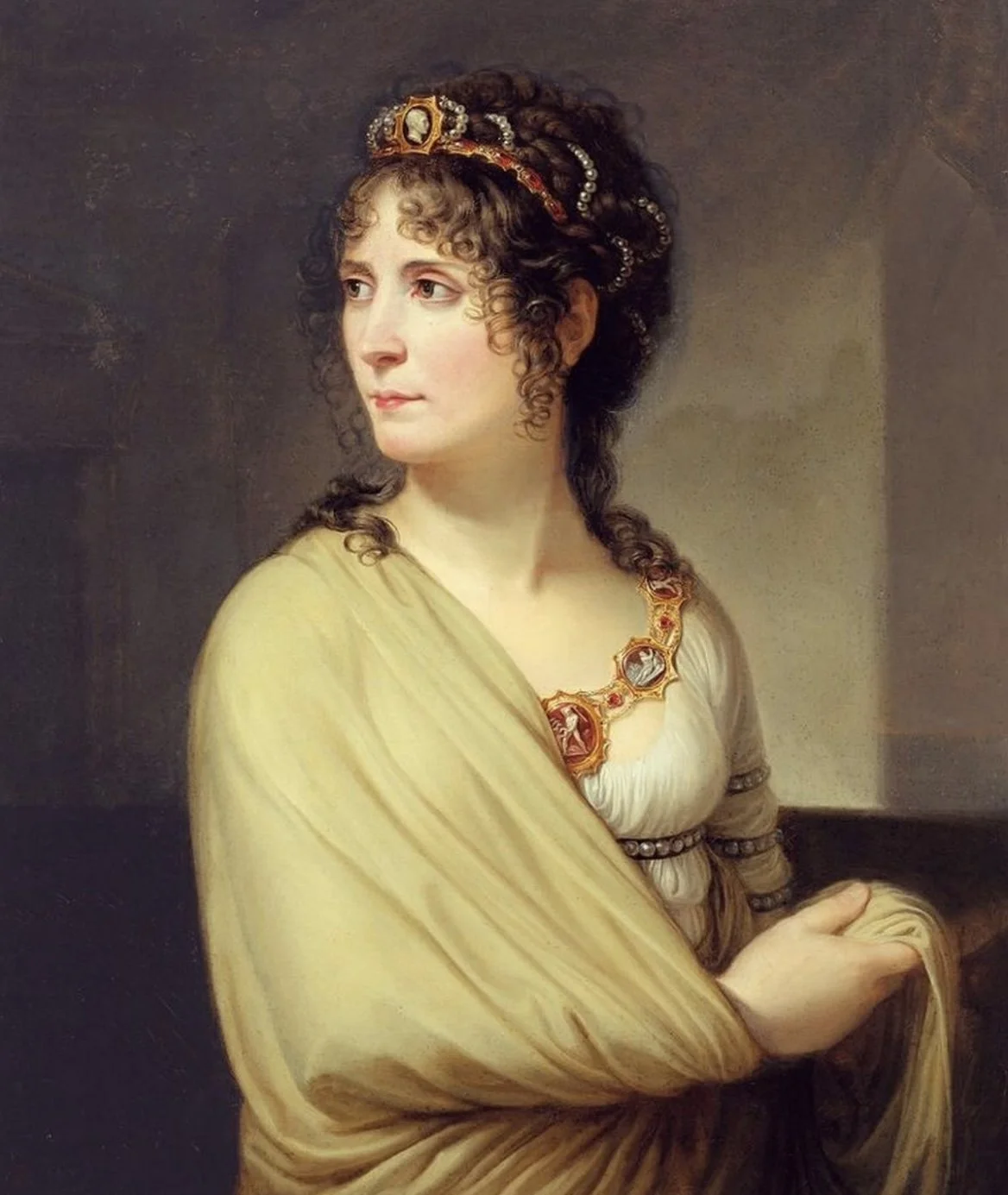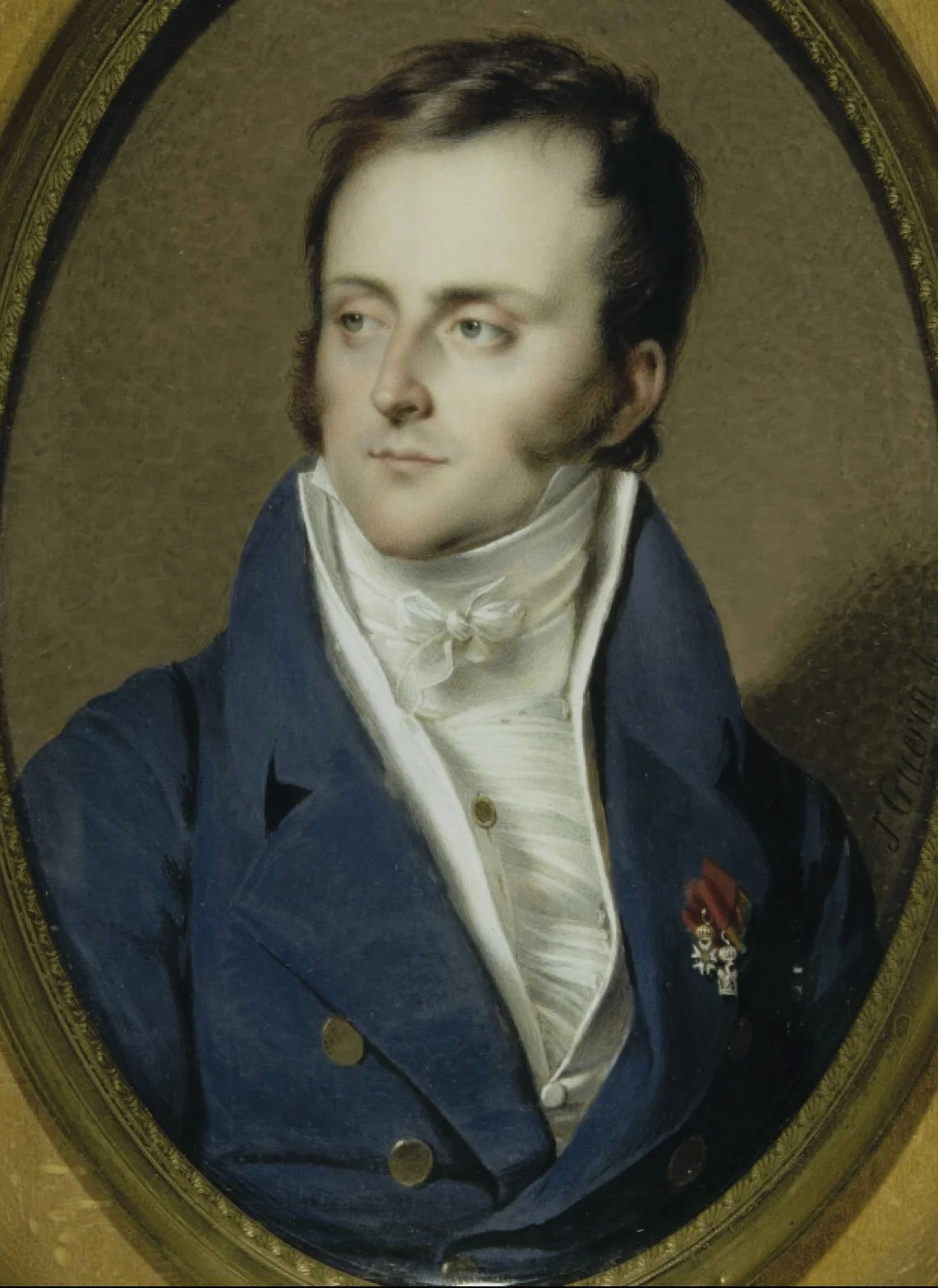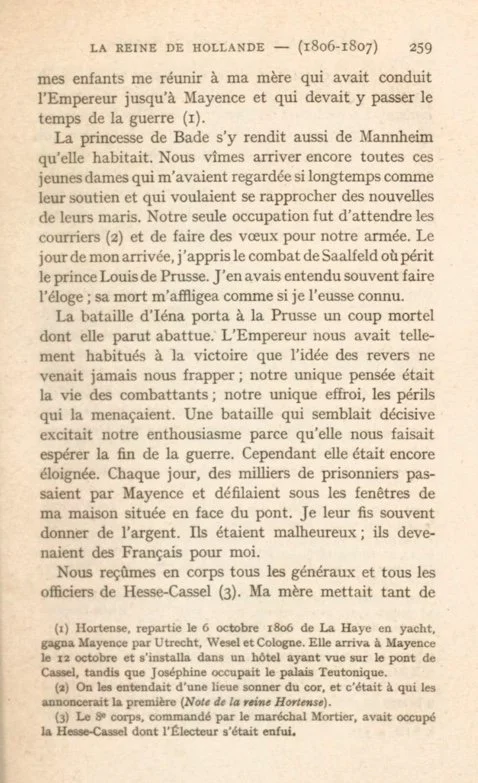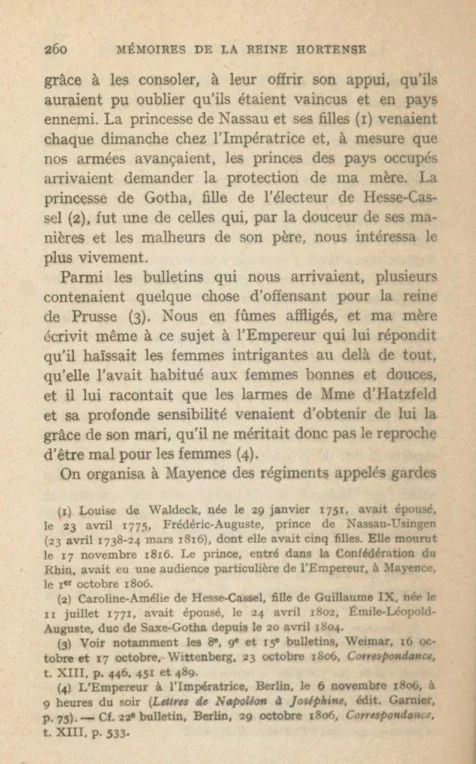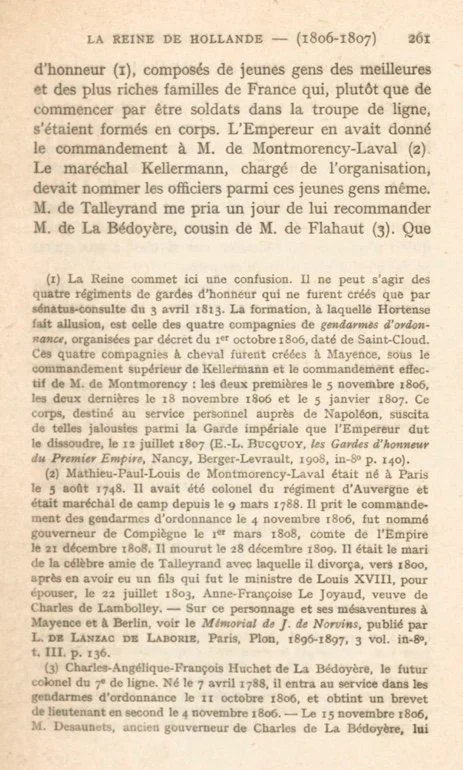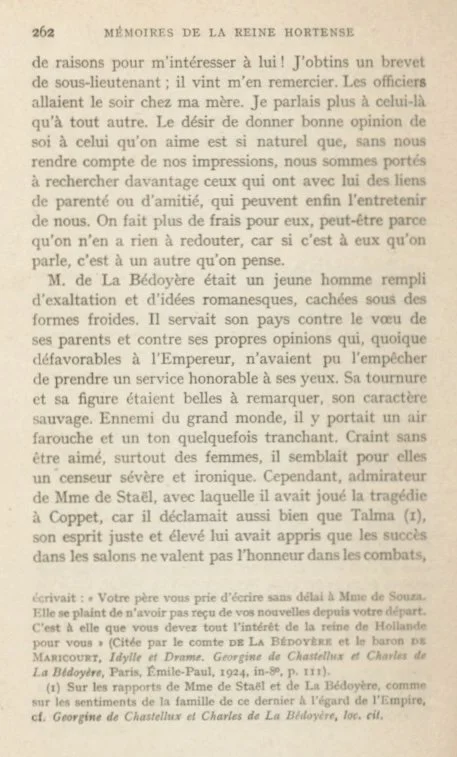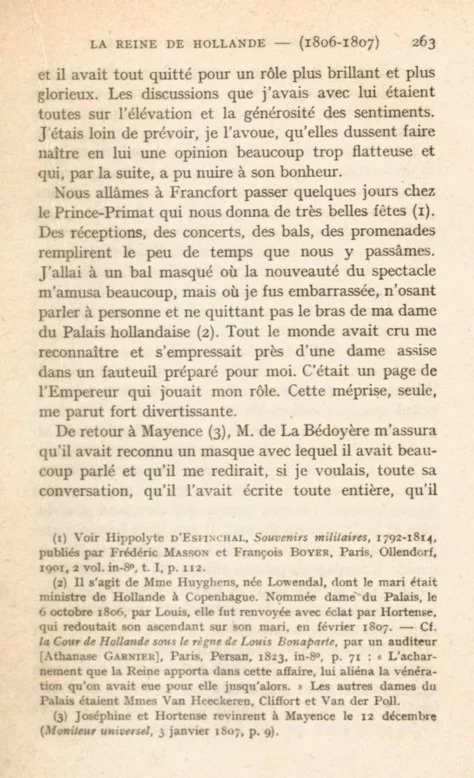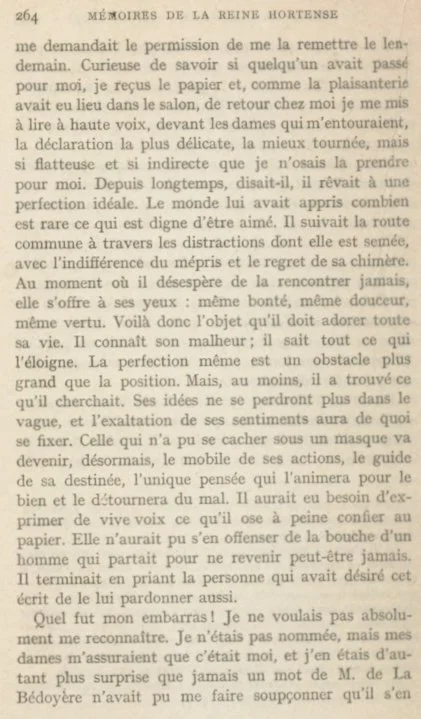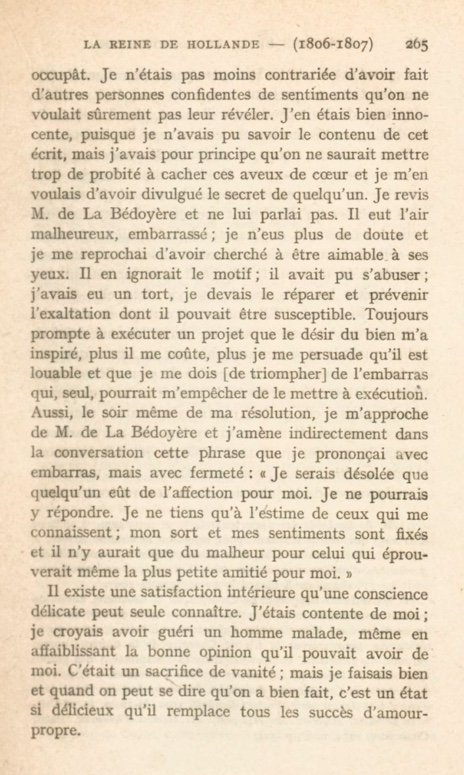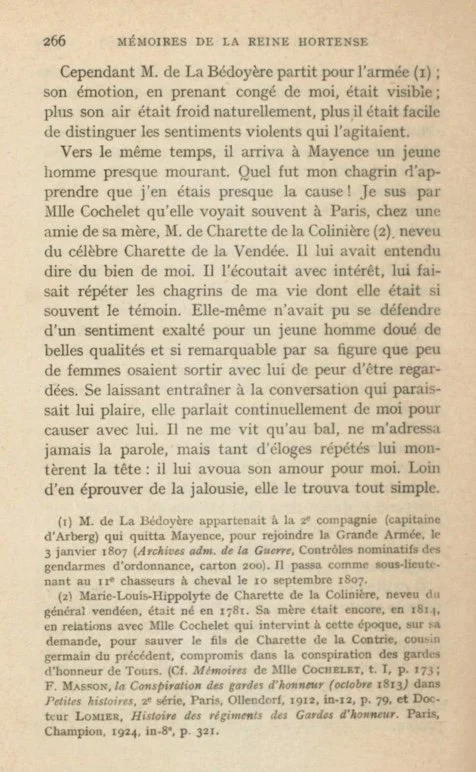Let’s have another look at Hortense’s Memoirs. If you want to read the book it is available for free at the side bar in English and French. Use the widget on the sidebar to translate the text below into pretty much any language.
In this excerpt, Talleyrand recommends Monsieur La Bedoyère to Hortense. La Bedoyère was an aristocrat who was sincerely won over to the Bonaparte cause. This probably started with his love for Hortense and in 1815, he was one of the many executed for his allegiance to this noble cause.
Hortense’s memoirs continues:
The Princess of Baden also came there from Mannheim where she was living. We witnessed the arrival of all those young ladies, who considered us their natural protectors and who were anxious to have news of their husbands.
Our time was spent in waiting for messengers from the front and praying for the success of our army. The day of my arrival I heard of the combat at Saalfeld where Prince Louis of Prussia was killed. I had often heard him well spoken of, and his death affected me as much as though I had known him personally.
The Battle of Jena dealt Prussia a mortal blow from which she seemed unlikely to recover. The Emperor had accustomed us so thoroughly to the idea of victory that the possibilities of a defeat never entered our minds. Our only anxiety was for the lives of the combatants, our only alarm was the thought of the dangers to which they were exposed.
A battle which seemed decisive aroused our enthusiasm because it made us anticipate a speedy end to the conflict. This however was still in the distant future. Every day thousands of prisoners passed through Mayence and marched by under the windows of my house which was situated opposite the bridge. frequently gave them money. They were unfortunate; therefore we considered them as no different from Frenchmen. We received in a body all the generals and officers b longing to Hesse-Cassel.
My mother was so tactful, consoling them for their defeat, in offering them her protection that they almost forgot they were prisoners in the enemy's country. The Princess of Nassau and her daughter came every Sunday to see the Empress, and as our armies advanced the princes from the different occupied territories appeared to ask for my mother's protection.
The Princess of Gotha, daughter of the Elector of Hesse-Cassel, was one of those with whom we sympathized most on account of her gentle manner and her father's misfortune. Among the official reports which reached us several contained uncomplimentary remarks about the Queen of Prussia.
We regretted this, and my mother wrote the Emperor in regard to it. He answered that he detested scheming women more than anything else in the world, especially as she (the Empress) had accustomed him to women who were gentle and kind.
He told her too how the tears of Madame d'Hatzfeld and her deep emotion had caused him to pardon her husband and that consequently he did not deserve to be called unfair in his treatment of her sex.
At Mayence regiments known as guards of honor were quartered. These regiments were composed of young men belonging to the best and richest families in France who, rather than begin their military career as privates in one of the line regiments, preferred these special corps.
The Emperor had placed these regiments under the command of Monsieur de Montmorency-Laval. Marshal Kellermann was in charge of their general organization and appointed the officers from among the recruits themselves. Monsieur de Talleyrand asked me one day to recommend Monsieur de La Bedoyère, a cousin of Monsieur de Flahaut. What a good reason for me to interest myself in him! I obtained his nomination as second lieutenant, and he came to thank me. The officers were in the habit of calling on the Empress in the evening. I spoke more with Monsieur de La Bedoyère than with the others.
The desire to make a good impression on the person one cares about is so natural that unconsciously we are inclined to seek out those who are related to him by ties of birth or affection and who will talk about us to him. We are more anxious to please these relatives perhaps because we feel at ease with them and in speaking to one we think of the other.
Monsieur de La Bedoyère was a highly-strung man full of romantic ideas which he concealed under an icy manner. He had enlisted against the wishes of his parents and against his own political conviction. Although hostile to the Emperor he did not consider that this prevented him from entering a career which he considered honorable.
His face and figure were strikingly handsome, but his character was unsociable. Detesting society, he had adopted a surly attitude and an abrupt manner of speaking. Women feared rather than admired him. They felt him to be an ironic and severe critic of their behavior. In spite of this he was an admirer of Madame de Staël, with whom he had acted tragedies at Coppet, for he had as fine a diction as Talma himself.
Monsieur de La Bedoyère had discovered, thanks to his sense of values, that drawing-room successes do not mean as much as honors gained on the field of glory. He had deserted society in order to play a part in another, sterner and more glorious setting.
The talks I had with him were all about idealism and the principles of magnanimity. I never imagined our talks were of a kind calculated to give him a far too flattering opinion of me, an opinion which later interfered with his happiness. We went to Frankfort for a few days' visit to the Prince-Primate who gave very fine receptions in our honor.
Evening parties, concerts, balls and excursions filled the short time we spent there. I attended a masked ball where the novelty of the scene amused me greatly, but where I felt much embarrassed and did not venture to speak to anyone or leave the arm of my Dutch lady in waiting. All the people had imagined they recognized me and crowded about a lady seated in a chair specially prepared for me. It was one of the Emperor's pages who took my part. This mistake in itself was enough to amuse me. On our return to Mayence Monsieur de La Bedoyère assured me that he had recognized a woman with a mask with whom he had had a long conversation. If I wished, he could repeat this talk word for word as he had written it all down.
He asked to be allowed to present me the account the next day. Curious to know if someone had passed herself off for me I took the paper, and as the incident had taken place at a reception, on my return home I began to read his note aloud to the ladies who were in attendance. It was a love-letter, delicately and tactfully worded but so indiscreet and so flattering that I did not dare believe it intended for me.
In this note Monsieur de La Bedoyère declared that for a long time he had dreamed of an ideal being. Life had taught him how rare it is to encounter a woman worthy of one's love. He had followed the ordinary rounds of pleasures, filled with contempt for them and longing to find his ideal. Suddenly when he had given up all hope he discovered this ideal before him exactly as he had imagined her, equally fair, equally kind, equally virtuous. He recognized the extent of his misfortune, he knew how remote from him his vision remained and all that stood between them.
Her very moral perfection was a greater obstacle even than her rank. But at least he had beheld the object of his dreams. No longer would his fancy roam idly this way and that, now all his ardor was turned toward a definite goal. She, who had not been able to conceal her identity beneath a mask, would from now on become his lode-star, the guide of his destiny, the influence that would make him do good and keep him from evil.
He desired to have the opportunity to say all that he dared hardly write. Surely, she would not take offense as the speaker would be a man about to take his departure, perhaps forever. He ended his letter by begging the person who had asked him to write it to forgive his having done so. I was extremely embarrassed.
I refused to admit that these phrases were meant for me. My name was not mentioned, but all my ladies assured me I was the person referred to. I was the more surprised as Monsieur de La Bedoyère had never said a word that would have made me think he was interested in me.
I was also much annoyed at having revealed to strangers sentiments the writer had certainly not intended them to know. To be sure I was not really to blame for I had had no idea of the contents of the letter, but as a matter of principle I believe one cannot be too discreet as regards matters of sentiment, and I was vexed at having disclosed anyone's secret.
I saw Monsieur de La Bedoyère again and made no reference to the matter. He seemed unhappy and ill at ease. I no longer had any doubt as to the identity of his ideal and reproached myself for having been unduly agreeable to him. He had not guessed the motive for my actions, he had misinterpreted them. I had been wrong, and it was necessary for me to remedy my fault and calm the over-enthusiasm of which he might be the victim.
I am always prompt in the execution of a plan that seeks to achieve some good purpose. The more difficult it is for me to carry it out, the more I persuade myself it must be done and that I must overcome my natural reluctance which alone prevents it. Consequently, on the same evening that I had made up my mind how to act, I approached Monsieur de La Bedoyère and, in the course of our conversation, I uttered the following speech in a firm although somewhat embarrassed voice:
“I should deeply regret it if anyone became attached to me. I could not return his affection. I only care for the respect of those who know me, my fate and my feelings have been fixed once and for all, and only misfortune could befall a person who cares for me in the least."
There is a certain inner satisfaction that only can be felt by a highly refined conscience. I was pleased with myself. I believed I had cured a man who was suffering, even though I had been obliged to lessen his good opinion of me. I had, to be sure, sacrificed my vanity to some extent, but I had performed a good deed, and when you feel you have done that, you experience a sense of satisfaction greater than any flattery to your self-esteem.
The original French is available below:

